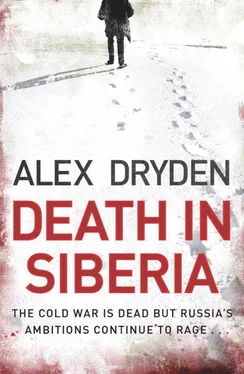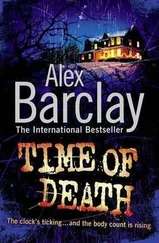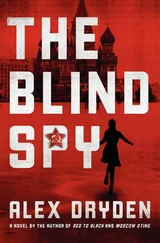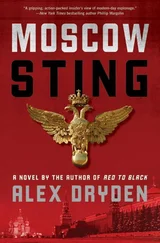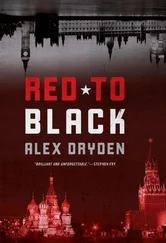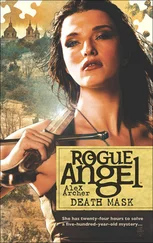‘I found something on the body of Professor Bachman,’ he began slowly. ‘It was overlooked by the killer, it was concealed too well.’ He put his hand into the inside of his jacket under the deerskin coat and withdrew the package he’d been carrying for ten days now. And he thought again of Gannyka, who’d told him that he possessed a secret that he didn’t know he possessed. He handed it to her.
Anna unwrapped the waterproofing and then found an old leather wallet, from inside which she extracted three pages of a small notebook. She stared at the first page, first with incomprehension, then amazement, and finally with a near shattering of all rational thought. What she saw was Professor Kryuchkov’s handwriting, studied and memorised by her at Burt’s Cougar Ranch in New Mexico. It was unmistakably his writing.
She quickly scanned the first page, then the second, and then the final one, and saw the jungle of equations, the two paragraphs of prose – everything that Petrov had seen but which had sent his mind into a dull waking sleep.
‘Where was it concealed?’ she asked him, not daring yet to approach the possibility that it was what she’d been sent to find.
‘In his shoe,’ Petrov replied. ‘I noticed the stitching was different on the left shoe to that on the right. More crude. Russian stitching. I cut the sole away and found it inside. Then I took it. I’d never done such a thing before in all my career in the militsiya . I don’t why I took it. But after I’d taken it, I handed the murder case over to the MVD as I had to do.’
‘So Bachman met Kryuchkov?’ Anna said.
‘I don’t know. Somehow I doubt it, though. But he met someone who knew Kryuchkov. That’s my best guess. Someone who had access to him.’ Petrov got up and sat next to Anna. ‘Look,’ he said, ‘it’s been written extremely hastily, perhaps in a dark room, I thought. Or perhaps he was being watched constantly. But somehow he got it out.’
Petrov looked at the papers in her hand. ‘But what does it mean?’ he asked.
Anna scanned the pages again. She couldn’t fully understand them, though she’d studied everything there was to know about muon catalysed fusion. But she knew the formula in front of her was what she’d been looking for – the commercial development of a new, safe and clean nuclear technology, sprung at last from its previous laboratory-only status. A holy grail that had been pursued for more than seventy years and finally been written off.
They both sat in silence, but another question was forming itself in Petrov’s mind, and one that had been there all along, since he’d found the woman lying on the road.
‘I believe I can trust you,’ he said, ‘but what about the people you work for? Whoever they are. The “We” you talk about. Might it not also be in their interest to suppress it, just as the Kremlin has tried to do?’
Anna didn’t reply immediately.
She thought of Burt Miller, the great, grandiose and bullish multi-billionaire who’d built Cougar from nothing into the world’s largest private intelligence agency; the man who had been a star CIA agent in his youth, who’d been stationed unofficially throughout Central Asia and in the south of Russia itself more than thirty years before. She thought of the nature of Burt Miller, the man she’d known well for nearly three years now, and had worked for tirelessly against her own country. Larger-than-life was not a big enough description of Miller. He was his own man, but a man of power too, like the siloviki in the Kremlin, a man who could subtly appoint the head of the CIA from within the ranks of Cougar, in a system of revolving doors between the private and the public intelligence communities that he’d exploited to his own massive advantage; a man who had the ear of the president of the United States and knew what was discussed in each daily briefing between the President and the CIA chief. Miller was one of the elite that ruled America behind the scenes; a man with a seat at the highly secretive Bilderberg Committee, with the Kissingers and the Rockefellers and the Perles. Miller was a businessman, and his business was intelligence. He walked the same corridors with the other men of power, including the men who controlled America’s and Europe’s and Asia’s energy needs. With the formula she held in her hand now given over to Miller, would Miller the businessman stick with his own? Would he quietly file it away – and in return take a stake in the companies that it would destroy – in return for more billions, and shares and stakes in the world’s biggest companies?
But Miller, most essentially – beyond business, beyond his authority among the world’s men of power, beyond anything – was a supreme individualist. A man for whom money itself meant little. At the core of Burt Miller was a lust for personal glory, for a place in posterity, in history itself, which more money and acclamation from politicians and the great couldn’t outweigh. While they would soon be forgotten, Miller would want his place in history to be remembered for ever – alongside that of Vasily Kryuchkov; the men who changed the world, saved the world, even. That was something, Anna was sure, that he wouldn’t be able to resist, no matter what the cataclysmic effect Kryuchkov’s formula had on his business peers. Anna smiled slightly. She was imagining Miller, at some huge and extravagant press conference – with all the drama and the melodrama that he loved – announcing to the world that he, Burt Miller, had come to save it. It would be his moment of greatest glory.
Yet, as she looked at the fine-boned face of Petrov sitting beside her and saw his quiet concern, she realised she could not explain this to him, let alone convince him.
She took a notebook of her own from the pocket of her jacket and gave him a pen.
‘Copy it out,’ she said. ‘Carefully. Check it three, four times, to make sure you’ve got it right. Then when it’s done, waterproof it well, seal it in a metal box and bury it somewhere in the Putorana.’
Petrov knew he would bury it in the cave with his grandfather.
‘That’s your insurance,’ she said. ‘But I believe you’ll read it soon in the world’s newspapers, hear it on every radio and see it on every television. I’ll find a way to contact you from the West. So you’ll know.’
The journey from the reindeer meadows to the small river took them half a day. Some of Petrov’s people carried her on a stretcher, even though she insisted she could walk now.
They’d built her a boat, more of a raft, something they used themselves to hide on when they went on expeditions to shoot duck and geese. It was strongly made of crossed branches, bound with rope, beneath. But the top was a medley of brush and smaller branches and grasses set and bound with grass at odd, natural angles. From above it looked just like the normal flotsam of the river’s vegetation.
‘From the air,’ Petrov told her, ‘from a helicopter, for example, it will look the same as one of the countless bundles of foliage that the snowmelt washes down these rivers at this time of year. You’ll be concealed underneath the top layer.’
Hidden beneath the tangle of brown and green, on the actual raft structure itself, a small rudder fashioned from a branch, protruded into the water. Lying concealed on her front, she could operate it with her feet, without ever being seen.
‘It’s about twenty miles along this river before you reach a tributary that goes off to the left,’ Petrov said. ‘Follow that for another hundred miles or so and you’ll reach a larger river that will take you to the gulf you’re looking for on the Kara Sea.’
He then gave her his militsiya pistol and ammunition.
‘I won’t be needing this any more,’ he said.
Читать дальше
